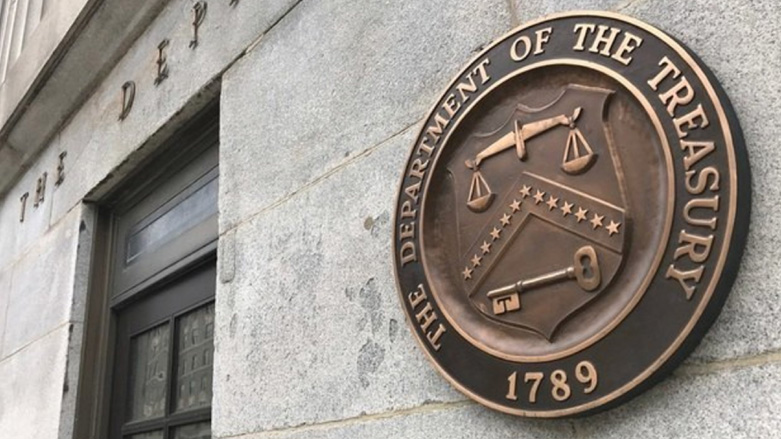US sanctions Hezbollah lawmakers, security chief

WASHINGTON DC (Kurdistan 24) — The US Treasury Department announced sanctions on Tuesday on three members of Hezbollah in Lebanon. Two are members of the Lebanese parliament, while the third heads Hezbollah security. The designations are part of an ongoing US campaign to roll back Iranian influence in the region.
Meanwhile, Israeli media reported on Tuesday that US and Iranian officials had held secret meetings at a hotel in Erbil, and one of the Iranian participants was a grandson of the late Ayatollah Ruhollah Khomeini.
However, a State Department spokesperson told Kurdistan 24 the report was “false.” There “is no validity” to it, she said.
Also, State Department Spokesperson, Morgan Ortagus, affirmed that the US remains firmly opposed to Turkey’s acquisition of the Russian air defense system, the S-400.
Russia’s largest news agency, TASS, reported on Tuesday, citing Turkish media, that the S-400 had arrived in Turkey. Replying to a question from Kurdistan 24, Ortagus dismissed the significance of the media reports, but affirmed, “Our position here at the State Department” on Turkey’s acquiring the S-400 “has not changed,” and “everybody knows” it, including “Turkish authorities.”
Her statement contravened Turkish claims after the June 29 meeting between US President Donald Trump and Turkish President Recep Tayyip Erdogan in Japan that Trump would overrule US agencies and ensure that Turkey was not be penalized for buying the S-400.
Rather, Ortagus cited two consequences for Turkey: its exclusion from the F-35 program and the imposition of congressionally-mandated sanctions, known as CAATSA (Countering America’s Adversaries Through Sanctions Act.)
Tuesday’s announcement that Washington was sanctioning two members of Lebanon’s Assembly of Representatives marked the first time it has taken such action against Lebanese parliamentarians.
As a senior administration official stated, “The gloves are officially off.”
“Iran has infiltrated [the Lebanese] government, and the United States cannot continue to support this infiltration through ongoing unconditioned aid to Lebanon,” he affirmed.
Iran’s influence in Lebanon is the product of a decades-long effort, going back to the early 1980s, as Tehran’s new revolutionary government exploited the civil war in that country to establish its position there. In the years since, Lebanon has become the model for Iranian expansion elsewhere, including in Iraq.
Indeed, The New York Times reported on Tuesday that the Trump administration “has also considered imposing economic penalties against militias in Iraq that are supported by Iran.”
Paul Davis, a former Pentagon analyst and now a Senior Fellow at Soran University, advised Kurdistan 24, “Lebanon is what Iraq could become.” Davis was particularly critical of the Obama administration for “ignoring Iran’s growing influence in Iraq,” as he affirmed, “The US has to be extremely vigilant.”

Amin Sherri is one of the two parliamentarians designated on Tuesday by the Treasury Department, which explained that Sherri has used his position “to pressure financial institutions to assist Hezbollah in limiting the impact of US sanctions.” He even threatened “Lebanese bank officials and their family members,” after the bank froze the accounts of a Hezbollah member whom the US had designated for supporting terrorism.
The second parliamentarian named on Tuesday is Mohammad Raad. Raad heads Hezbollah’s parliamentary bloc, which holds 13 seats in the Assembly of Representatives. According to the Treasury Department, Raad has helped Hezbollah circumvent US sanctions, and, along with Wafiq Safa, who was also designated, “maintained a list of a hundred Hezbollah members who were to acquire foreign citizenship.”
“With these passports, these individuals would be sent by Hezbollah on long-term missions to Arab and Western countries.,” it said.

Safa heads Hezbollah’s security apparatus, and Firas Maksad, a Lebanese native and Director of The Arabia Foundation in Washington DC, identified him as the most significant of the three men designated on Tuesday.
Safa used Lebanon’s ports and border crossings to “facilitate travel” for Hezbollah members and “smuggle contraband,” into the country, including “illegal drugs and weapons,” the Treasury Department stated.
Maksad described the extent of Safa’s authority in a tweet, by citing the claim of the Druze leader, Walid Jumblatt. According to Jumblatt, there are certain parts of Lebanon for which the Lebanese army, itself, needs Safa’s approval, without which it cannot go into those areas.
Editing by Nadia Riva
